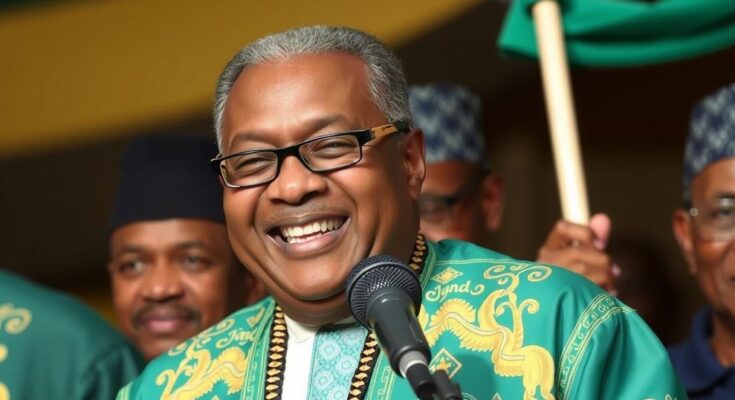John Dramani Mahama has won Ghana’s presidential election, securing 56.5% of the vote amid widespread dissatisfaction with the government’s economic management. His primary opponent, Vice President Mahamudu Bawumia, conceded defeat. Mahama promises to address the country’s economic challenges, reflecting a global trend favoring opposition parties under similar circumstances.
ACCRA – John Dramani Mahama, the former president of Ghana, has been officially declared the victor of the recent presidential election, a result that reflects widespread discontent with the current government’s management of the economy. Having served as president from 2012 to 2017, Mahama secured 6.3 million votes, amounting to 56.5% of the total ballots cast. The electoral commission’s announcement followed a concession of defeat by his primary opponent, Vice President Mahamudu Bawumia, who garnered 4.6 million votes or 41%.
The overall voter turnout reached 60.9%, based on results from 267 constituencies, according to Jean Mensa, the electoral commissioner, who assured that ongoing vote counting in nine constituencies would not alter the final outcome. Mahama described his victory as “emphatic” and expressed intentions to “reset” the nation across various sectors, focusing heavily on economic revival—a crucial issue that resonated particularly with younger voters looking for solutions amidst the country’s severe economic crisis.
Following Bawumia’s concession, celebrations erupted among Mahama’s supporters, especially in the capital, where jubilant crowds donned the colors of his National Democratic Congress (NDC) party. This election, which included both presidential and parliamentary positions, unfolded against the backdrop of Ghana’s most significant cost-of-living crisis in decades, marking a critical test for democracy in a region troubled by political instability. The Economic Community of West African States (ECOWAS) reported that the election proceeded peacefully, continuing Ghana’s tradition of stable democratic processes.
Bawumia represented the ruling New Patriotic Party (NPP), which struggled to alleviate the economic challenges faced by outgoing President Nana Akufo-Addo. Mahama’s victory is perceived as a part of a wider global trend favoring opposition parties over incumbents amid economic distress, similar to recent shifts seen in countries such as the United States, Britain, France, and South Africa.
Jude Agbemava, a policy analyst who supported Mahama, asserted that the former president is “the only person” capable of rejuvenating the struggling Ghanaian economy. Political science expert Seidu Alidu emphasized that the vote reflected citizens’ frustrations about a government that has lost public trust, acknowledging the vital necessity for elected officials to effectively communicate with their constituents, particularly during economic hardships.
In recent democratic developments in Ghana, former President John Dramani Mahama emerged victorious in a presidential election that underscored voter dissatisfaction with economic management. Mahama’s campaign gained traction against the backdrop of Ghana’s severe cost-of-living crisis, which has prompted a reevaluation of the current government’s effectiveness. His party, the National Democratic Congress, capitalized on this discontent and demonstrated a successful strategy that resonated with the electorate, particularly the youth. The political climate in Ghana reflects broader trends in global electoral politics, where opposition parties are increasingly gaining ground against incumbents amidst economic challenges.
John Dramani Mahama’s decisive victory reflects a significant shift in Ghana’s political landscape, as voters expressed their discontent with the current administration’s economic management. With an emphatic mandate, Mahama seeks to address the pressing economic concerns that resonate deeply with constituents. This election not only highlights the evolving dynamics of Ghana’s democracy amidst regional challenges but also showcases a global trend favoring opposition parties during economic uncertainties. Mahama’s victory signals a potential new direction for the nation as it confronts persistent economic issues.
Original Source: www.clickondetroit.com




